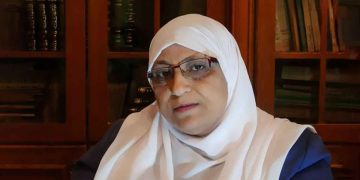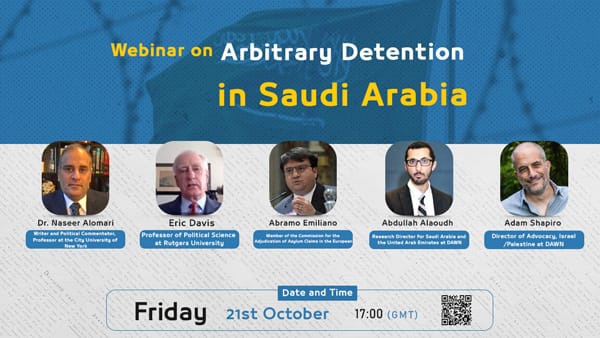On Friday 21 October, the Arab Organisation for Human Rights in the UK (AOHR UK) hosted a successful webinar on the burning question of arbitrary detention in Saudi Arabia, with a panel of speakers from across global civil society and academia.
Since Mohamed bin Salman, known as MBS, was appointed as Crown Prince in 2017, the Kingdom’s already poor human rights record has worsened still further. MBS’ repression of Saudi activists, scholars, and intellectuals has become infamous, with campaigns of repression such as that waged against women’s rights activists in 2018 and 2019 attracting global criticism.
MBS’ presentation of a reforming face following the international condemnation of his regime’s brutal assassination of Jamal Khashoggi in 2018 has not resulted in any substantial improvements to the country’s political or judicial system.
Ranked as ‘Not Free’ by Freedom House, the Saudi state, which remains a key ally of the US, Britain, and France, is amongst the most repressive internationally.
It is in this context that the AOHR UK was honoured to host Prof. Eric Davis, who teaches political science at Rutgers University; Prof. Naseer Alomari, who teaches at CUNY; Adam Shapiro, who is Director of Advocacy for Israel/Palestine at Democracy for the Arab World Now (DAWN); Emiliano Abramo, a member of the EU’s Commission for the Adjudication of Asylum Claims; and Abdullah Alaoudh, the Research Director for Saudi Arabia and the United Arab Emirates at DAWN.
AOHR UK was particularly honoured to host Mr. Alaoudh, in light of his and his family’s persecution by the Saudi regime.
Speaking first, Prof. Davis began his overview of the Saudi-US relationship by saying that, “the MENA region is really at a crisis point at the moment”.
“MBS is not a particularly effective ruler and I think he has deviated from much of the previous consensus, which has affected Saudi-US and Saudi-Gulf relations”, said Prof. Davis.
Whilst “[MBS] is trying to achieve legitimacy amongst the younger generation (…) and allowing people to go to restaurants, to go to sporting events, which has earned him a lot of support (…) We know that we have extensive human rights violations, and that’s very disturbing, because we know that a lot of countries are very dependent on Saudi oil – but, at the same time the international community cannot stand by.”
“In a world with a lot of democratic backsliding”, Prof. Davis continued, “one thing that needs to be done is to create an international consensus and to say that Saudi Arabia is obviously an important member of the international community, but one individual, MBS, cannot be in a position in which he treats the country like his playground, like his sandbox.”
“To remain silent and allow MBS to continue to function in the way he has will only embolden him to engage in even more problematic behaviour”, Prof. Davis argued.
Speaking next, Prof. Alomari said that “MBS is a danger to himself, to Saudi, and to the Middle East generally. He has taken decisions that real political players would not take”, mentioning Saudi interventions in Yemen and Lebanon, and disputes with Qatar.
“The Killing of Jamal Khashoggi I thought was outrageous and really spoke volumes about this man and his mindset, and showed how dangerous he can really be”, Prof. Alomari said. In his view, the belief across Western governments that MBS can be controlled is “wrong, just as they were wrong about Saddam Hussein.”
“The West is facing a serious challenge [with Saudi], but I will just say this – every time that they sided with Arab dictators, things turned out to be really bad for both the Middle East and for America.
“Saddam Hussein, who everybody tolerated because he was fighting Iran – well, we know the result”, Prof. Alomar said. “The same mistake is being made with Mohamed bin Salman. He is a true threat to Saudi Arabia, to the Middle East, and to the world, if he is not stopped.”
Mr. Shapiro spoke to DAWN’s legal efforts against MBS for the killing of Jamal Khashoggi, which have included campaigns in both the US and France.
Mr. Shapiro argued that the US’ role in the Middle East and in particular its support for non-democratic regimes and practices would have to change over the forthcoming period
“As there’s more and more awareness [that] the US and other Western states are increasingly walking a path of double standards, of hypocrisy, and so on – and that isn’t satisfying the causes of justice or even the US’ national security interests any more.”
“We as civil society, as members of a global, empowered civil society, need to keep up our pressure, give voice to the voiceless, and hold our own governments to account”, Mr. Shapiro added.
Mr. Abramo explained his experience of speaking to Yemeni and Ethiopian nationals who had migrated to Italy, some of whom had left Saudi Arabia for Italy due to the harsh conditions in the Kingdom.
Mr. Abramo argued that the EU needed to take action against Saudi repression.
The evening’s final speaker, Mr. Alaoudh, gave an overview of civil activism in Saudi Arabia in 2011-era, explaining that people’s demands focused on the enactment of the various legal limitations that the state was itself bound by.
However, “In 2013, 2014, and 2015, [the authorities] created another path – they said, ‘if you guys want us to apply the law, guess what, we will, and they enacted the counter-terrorism law and the anti-cybercrime law, designed not to try terrorists but rather activists, peaceful activists, public human rights defenders, women, and so on.”
Afterwards, Mr. Alaoudh explained the history of repression against Saudi civil society since that period. “All these waves of arrests have kept going, because of this paranoia about [the regime’s] own citizens”, Mr. Alaoudh explained, mentioning the shocking instance of 81 citizens being executed on the same day that former British Prime Minister Boris Johnson visited the country.
The webinar ended with Mr. Alaoudh explaining the plight of his father, Salman Alaoudh, who was detained in September 2017, and his wider family, nineteen of whom are currently subject to travel bans. Abdullah criticized the “absurd brutality against my family and me”.
The AOHR UK extends our gratitude to all of the evening’s speakers, and our solidarity with the Alaoudh family and all those suffering similar repression in Saudi Arabia.






























